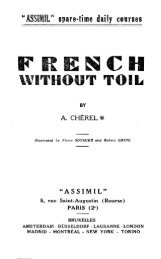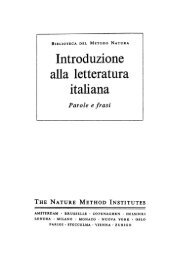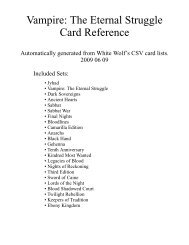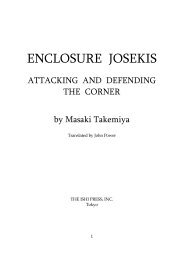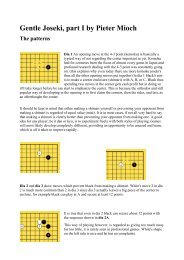Plains Cree: A Grammatical Study - Computer Science Club
Plains Cree: A Grammatical Study - Computer Science Club
Plains Cree: A Grammatical Study - Computer Science Club
You also want an ePaper? Increase the reach of your titles
YUMPU automatically turns print PDFs into web optimized ePapers that Google loves.
Although the goal of linguistic description is well<br />
known, the complexity of language is such that a<br />
complete grammar does not exist of any language,<br />
ancient or modern. Since the linguistic study of a<br />
particular language is a cumulative process, however,<br />
it is useful to provide progress reports at certain<br />
points: neglected areas will then become obvious and<br />
research plans can be integrated into a coherent<br />
scheme.<br />
The present study outlines an integrated statement<br />
of the morphological structure of the <strong>Plains</strong> dialect<br />
of <strong>Cree</strong>, an Algonquian language. While its primary<br />
aim is to provide a framework for further investi-<br />
gation, this work may also serve as an introduction<br />
to the study of <strong>Cree</strong> texts.<br />
The exposition of the grammatical categories of<br />
<strong>Cree</strong> is based on a detailed morphological and semantic<br />
analysis of the inflectional paradigms. The sketch<br />
of word formation, which is necessarily less compre-<br />
hensive, is intended to highlight some of the more<br />
productive and characteristic patterns of derivation<br />
and composition.<br />
This study is a revised version of my 1969 Yale<br />
University dissertation, "An Outline of <strong>Plains</strong> <strong>Cree</strong><br />
Morphology" whose basic orientation remains un-<br />
changed. It is primarily based on data collected in<br />
Alberta in 1967-1968; more recent and continuing<br />
informant work, mainly in Manitoba, requires only<br />
one or two additions which are specifically noted in<br />
the text. Examples are also drawn from the pub-<br />
lished texts of Leonard Bloomfield.<br />
I am grateful to Floyd G. Lounsbury for his<br />
criticisms and suggestions during the writing of the<br />
PREFACE<br />
3<br />
original manuscript; in many cases he pointed out<br />
the more general implications of specific problems.<br />
Warren C. Cowgill was kind enough to send me a long<br />
and detailed list of comments. Thanks are also due<br />
to Charles F. Hockett who first introduced me to the<br />
"marvellous complexity" (Bloomfield) of the Algon-<br />
quian languages; he has read and extensively criti-<br />
cized all my efforts in Algonquian linguistics, including<br />
the present one, and where I have disregarded his<br />
advice, I alone am to blame. The greatest debt,<br />
of course, is to the <strong>Cree</strong> speakers who with consider-<br />
able patience and generosity taught me some under-<br />
standing of their language.<br />
It is a pleasure to acknowledge the field support<br />
during 1967-1968 of the National <strong>Science</strong> Foundation<br />
(GS-1535), the Wenner-Gren Foundation for Anthro-<br />
pological Research, and the Phillips Fund of the<br />
American Philosophical Society; and from 1969 to<br />
1971, of the Research Board of the University of<br />
Manitoba. The writing of the original dissertation<br />
was supported by Yale University which, together<br />
with the Studienstiftung des deutschen Volkes, also<br />
largely financed my graduate studies.<br />
From Oblate Fathers to sound technicians, acknowl-<br />
edgments are due to more people than can be named.<br />
This preface would be incomplete, however, without<br />
special thanks to my wife Juliane whose part in it far<br />
exceeds that of the perfect <strong>Cree</strong> typist.<br />
nikdwiy e-wi-petamawak.<br />
University of Manitoba<br />
Winnipeg, Canada<br />
December 1971<br />
H.C.W.



